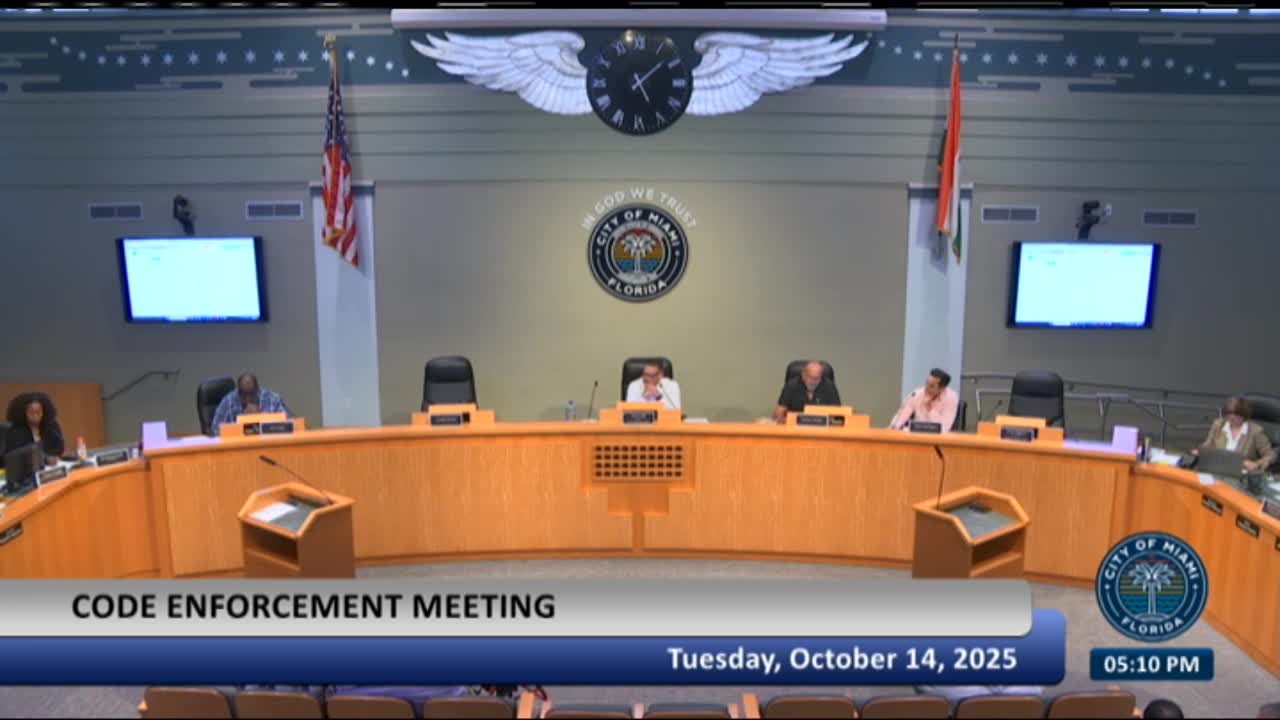City of Miami Code Compliance Board grants multiple extensions, finds numerous properties in violation
Get AI-powered insights, summaries, and transcripts
Subscribe
Summary
The City of Miami Code Compliance Board heard more than two dozen cases on alleged code violations and granted mostly time-limited extensions to bring properties into compliance. The board issued dozens of findings of guilt or default, commonly granting 90–120 day compliance windows and daily fines thereafter.
The City of Miami Code Compliance Board met to hear code-enforcement cases involving vacant-property registration, work performed without permits, missing certificates of use (CU) or Business Tax Receipt (BTR), and historic‑district approvals. The board granted time to correct violations in most cases and entered findings of guilt where owners or representatives pleaded guilty or failed to appear.
The hearing opened with roll call and a reminder of appeal rights to the Eleventh Judicial Circuit Court of Florida. Inspectors from the city presented evidence in each matter; respondents and their representatives described steps taken or requested more time to obtain permits, register structures, or remove unpermitted work.
Why it matters: Code‑compliance adjudications set deadlines and per‑day fines that can become liens on property if unpaid. For property owners and managers, the board’s rulings determine whether legalizing work through permits or administrative filings must proceed immediately or whether temporary relief is available while plans and inspections proceed.
Key outcomes - Extensions for permit processing and construction legalization were the most common result. The board repeatedly granted 120‑day extensions when the inspector or director reported permit applications were in process, and shorter windows (30–90 days) when the work required only registration or cleanup. - Typical fines if a case is not cured within the ordered time ranged from $2.50 per day (administrative commercial/certificates) to $150–$250 per day for residential or repeat violations; the board applied historic‑district fines where applicable. - Several cases were found in compliance or adjudicated without further fine where the city confirmed corrections during the hearing.
Votes at a glance (selected docket entries – case number / address / outcome) - Case 108.328 — 2495 Southwest 21st Terrace: Extension of time granted (120 days) to complete impact‑window permitting and install windows; motion carried. - Case 126679 — 660 Southwest Fourth Street: Guilty; 120 days to comply and $2.50 per day thereafter (motion carried). - Case 133457 — 1430 Northwest 28th Street (renovation work without finalized permits): Guilty; 120 days to obtain permits and legalize work; $250 per day thereafter (motion carried). - Case 00111440 — 4221 Northwest Eleventh Court: Guilty; 120 days to legalize construction and register units; $250 per day thereafter (motion carried). - Case 00110782 — 1809 Northwest 47th Terrace: Guilty; 120 days to cure; $250 per day thereafter (motion carried). - Case 00139257 — 141 Northeast 204th Street: Guilty by default; 120 days to cure; fines to follow if not complied (motion carried). - Case 0098209 — 467 Northeast 50th Street (historic Palm Grove fence): Guilty; 120 days to comply; $150 per day thereafter (motion carried). - Case 00079037 — 4101 Northwest Eleventh Place: Inspector reported compliance during hearing; adjudication with no further fine entered. - Case 00076442 — 1429 Southwest Third Street (CU/BTR): Guilty; 90 days to obtain certificate(s); $2.50 per day thereafter (motion carried). - Case 00134851 — 1375 Northwest Fiftieth Street: Guilty; 60 days to demolish or legalize unpermitted backyard structures; $250 per day thereafter (motion carried). - Case 131994 — 7610 Biscayne Boulevard (church converted to event space): City and planning staff are reviewing a valet‑parking certificate condition; board granted 120 days while the planning review proceeds; $2.50 per day thereafter (motion carried). - Case 00132103 — 210 Northeast 82nd Street (multi‑tenant building with missing CU/BTR for some businesses): Guilty; 90 days to comply; $250 per day thereafter (motion carried). - Case 00133062 — 1168 Northwest Second Street (vacant lot registration & clean‑up): Guilty; 30 days to register and clean; $2.50 per day thereafter (motion carried). - Case 00109107 — 4702 Northwest Tenth Avenue (wood fence without permit): Guilty; 120 days to obtain permit/permit approval; $150 per day thereafter (motion carried). - Multiple other cases on the docket (dozens) resulted in similar orders — commonly 3 days for immediate compliance in commercial CU/BTR failure matters, or 3–120 day windows where permits or registrations were in process; fines generally set at $250 per day (residential/structural), $150 per day (historic district or mid‑range fines) or $2.50 per day for specific administrative penalties where noted.
What the board asked and what respondents said Inspectors repeatedly told the board that permit applications, plan reviews or unsafe‑structure holds were the primary reasons for requested extensions. Respondents and representatives said they had applied for processes (permits, CU, BTR, or temporary use permits) and requested time to finalize approvals. Where work was already underway without permits, inspectors recommended timelines that balanced public safety/health concerns with allowing code‑legalization through the permitting process.
Process and next steps - The board reminded respondents that if ordered corrections are not completed within the time ordered, daily fines begin to run and unpaid fines may become liens on property. The board also noted that orders can be appealed to the Eleventh Judicial Circuit Court of Florida within 30 days. - Where respondents reported ongoing permit applications, the board and inspectors reminded them to stay in close contact with the assigned inspector and to file documented extension requests before a deadline expires if more time is needed.
Ending note The board’s docket was heavy with cases about work without permits, failed registrations for vacant or blighted structures, and missing certificates of use or business tax receipts. The pattern of rulings — time‑limited compliance windows coupled with per‑day fines — reflects the board’s practice of allowing time for legal filings while preserving enforcement mechanisms if owners do not complete the required corrections.
